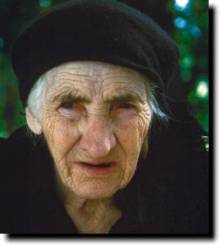|
|
Another Case of Abuse in Elder's Home
Chip Johnson, SFGate
May 30, 2005

The tale that came to light last week involving alleged gang members who overran the Mission District home of 84-year-old Ellen Gutierrez brought the memories flooding back for Tom Scovill.
It wasn't so long ago that Scovill, 45, battled a similar case of elder abuse on his quiet, tree-lined street in San Leandro that took police five months to crack.
It started in the summer of 2002 when Scovill's neighbor, an elderly woman named Mary Basera, took in a woman she had raised as a teenager. Basera, who Scovill said was more than 80 years old at the time, provided a makeshift living space in her garage for Lena Bianco and her then-husband.
Over the next 15 months, Bianco and her companions took over the house at 350 Sybil Ave., drained Basera of her life's savings and turned her home into a flophouse for drug users and ex-cons fresh out of prison.
The trouble began soon after Bianco and her family moved in and quickly spread from the garage to the streets and eventually into the elderly woman's home. After Bianco and her husband broke up, she and her kids were living in the house.
In February 2003, Bianco's dog, a pit bull named Kilo, got loose and went after Scovill's dog while his wife and child were walking to preschool. A month later, two teenage boys, rivals for the affections of Bianco's teenage daughter, battled it out in the street.
It was about that time that Scovill became disturbed, because he rarely saw Basera puttering around her home or in the yard.
A month later, when an unemployed Bianco showed up driving a new car and adorned with new clothes and jewelry, Scovill became very suspicious. "She was wearing gold jewelry, a nice new leather jacket and was sporting fresh, new tattoos," he recalled.
Scovill went online, searched the property records and found up his neighbor's address -- and the records explained the ostentatious behavior next door: Bianco had obtained power of attorney from Basera and had taken out a $150,000 second mortgage on the house. When Scovill saw that, he contacted the San Leandro Police Department.
Police had no grounds to investigate the matter because there was no immediate evidence of a crime, but Scovill's letters and documentation of continuing incidents convinced authorities that there was a problem.
Things at Basera's home by then were deteriorating rapidly. Men started showing up at the house and appeared to be staying there. Groups gathered in the garage, playing loud music until the early hours of the morning. Trash began to pile up in the backyard.
Within a couple of months, police, working with the neighbors, came up with a plan to lay down a heavy police presence. They apologized in advance for any inconvenience the neighbors might have to endure.
Then they went to work, stopping any and all suspicious characters, raiding the house on at least two occasions and arresting parolees there on a seemingly regular basis. Over a five-month period, police arrested more than 60 people at or near the address and recovered more than a few stolen vehicles.
In one incident, police asked Scovill to look around his backyard because they believed a fleeing suspect had ditched something there before he was caught. About six weeks later, his wife, Lisa, found a baggie of what turned out to be black-tar heroin in the yard.
During the crackdown, police were involved in a high-speed freeway chase of a stolen vehicle, chased suspects through backyards and generally provided no breathing room for occupants of Basera's home.
Authorities also learned that at some point during the crackdown, Basera's brother had come and taken her to live with him in suburban Sacramento.
"She left all her heirlooms, all her possessions in her home because she was scared to death," said Detective Cathy Pickard, a fraud investigator who worked on the case.
Investigators said the elderly woman was so afraid that she refused to speak with investigators by phone for fear of reprisal, Pickard said. As it turned out, Basera had good reason to be frightened.
Police later learned that one of Bianco's former romantic interests, a state prison inmate, was referring recently released inmates to the address as a safe house.
Bianco's scheme came crashing down in September 2003 when police raided the house and arrested her on suspicion of elder abuse. Her case is in criminal court.
What investigators found at the house was incomprehensible. It had no electricity, water or gas. Inhabitants had begun using the backyard as a toilet. There were rats and mice and enough garbage and debris to fill 14 trash bins.
By the time the raids were over, authorities had taken more than a dozen people from the house. Police awarded Scovill a Citizen's Commendation for his efforts.
"If the neighbors had not alerted us and worked with us as closely as they did, we may have never figured out what happened with Mary," Pickard said.
Basera got the last laugh. On a whim, Bianco invested $1,000 from the second mortgage on Basera's house in a digital imaging startup that has done pretty well. Basera, who sold her home after the incident, now also receives regular dividends from the investment.
|
|



